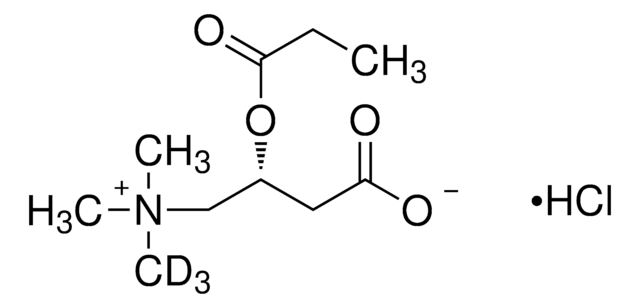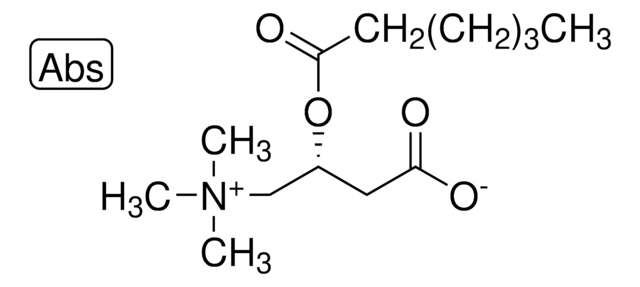42602
Propionyl-L-carnitine
≥94.0% (HPLC), suitable for LC/MS
Sinónimos:
(2R)-3-Carboxy-N,N,N-trimethyl-2-(1-oxopropoxy)-1-propanaminium inner salt, L-Carnitine propionyl ester, C3-Carnitine, Propanoyl-L-carnitine
About This Item
Productos recomendados
Nombre del producto
Propionyl-L-carnitine, ≥94.0% (HPLC)
Nivel de calidad
Ensayo
≥94.0% (HPLC)
Formulario
powder or crystals
actividad óptica
[α]/D -23±3°, c = 1 in H2O
técnicas
LC/MS: suitable
impurezas
≤10% water (calcd. from elemental analysis)
color
white to off-white
temp. de almacenamiento
2-8°C
cadena SMILES
[O-]C(C[C@@H](OC(CC)=O)C[N+](C)(C)C)=O
InChI
1S/C10H19NO4/c1-5-10(14)15-8(6-9(12)13)7-11(2,3)4/h8H,5-7H2,1-4H3/t8-/m1/s1
Clave InChI
UFAHZIUFPNSHSL-MRVPVSSYSA-N
¿Está buscando productos similares? Visita Guía de comparación de productos
Categorías relacionadas
Descripción general
Aplicación
Acciones bioquímicas o fisiológicas
Código de clase de almacenamiento
11 - Combustible Solids
Clase de riesgo para el agua (WGK)
WGK 3
Punto de inflamabilidad (°F)
Not applicable
Punto de inflamabilidad (°C)
Not applicable
Elija entre una de las versiones más recientes:
¿Ya tiene este producto?
Encuentre la documentación para los productos que ha comprado recientemente en la Biblioteca de documentos.
Los clientes también vieron
Nuestro equipo de científicos tiene experiencia en todas las áreas de investigación: Ciencias de la vida, Ciencia de los materiales, Síntesis química, Cromatografía, Analítica y muchas otras.
Póngase en contacto con el Servicio técnico




![[(3R)-3-Hydroxybutyryl]-L-carnitine analytical standard](/deepweb/assets/sigmaaldrich/product/structures/658/500/ff9570f8-a346-4077-9983-d0e67400bf47/640/ff9570f8-a346-4077-9983-d0e67400bf47.png)







